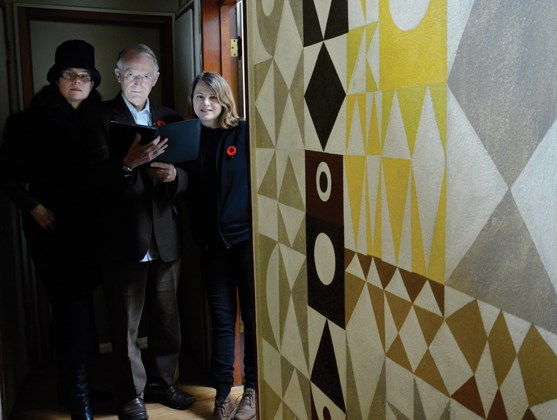One of Western Canada's most important pieces of architecture may soon be sold by The Land Conservancy into private ownership.
A B.C. Supreme Court judge will rule on Nov. 18 whether West Vancouver's Binning House, the home of artist, architect and the father of West Coast modernism B.C. Binning, can be sold by the conservancy to help get the non-profit out of financial trouble.
The potential sale is being called a "winwin-win" scenario by John Shields, manager of The Land Conservancy, but advocates for the touchstone home of modern architecture are alarmed by the prospect.
The anonymous buyer has offered $1.6 million for the home and the promise of restoring it to its "former glory."
"That offer came as a surprise. We had not even considered putting the Binning House into our list of potential properties for sale. Because it came as an unsolicited offer that was in excess of the assessed value, we began to explore the possibility of tracking down and satisfying ourselves that the offer was in fact as good as it looked," Shields said.
All Shields could say about the potential buyer is that he is a prominent Lower Mainland developer and a major collector of Binning's work.
The Land Conservancy has been given 48 properties for environmental or heritage protection, but the non-profit organization wound up in creditor protection last month after being unable to pay its bills. The financially troubled organization had put mortgages on some of its properties in order to pay operating expenses.
If the sale goes through, the buyer has the intention and the wherewithal to restore it, which is good for heritage preservationists and the home, which is already designated a national historic site, Shields said.
"We're doing something that meets our objective, which is to realize money from property but also meets our objective of continuing the preservation of historical value to the extent that's humanly possible," he said.
But the Binning House has strong advocates outside the conservancy who are also vowing to be heard before the sale is approved.
"That's very, very worrisome news. Heritage advocates across the country and lovers of the Binning House are quite nervous and angry in many cases. This is appalling," said Adele Weder, an architecture journalist, who wrote her masters in architecture degree thesis on the Binning House.
Besides its design - revolutionary when the house was built in 1941 - Binning's home was a gathering point for fine artists, architects, professors and students, poets and writers.
"It became a touchstone for West Coast Modernism. All the artists and architects in the region were inspired by Binning's house, like a cipher of Rosetta Stone. It was like an encyclopedia.
So much of our culture was incubated in that house," she said.
Weder was a friend of Binning's wife Jessie, until her death in 2007. Jessie Binning left the home to trustees to assure it would remain a place of architectural inspiration and study in public hands.
"She expressed to me and her trustees and, obviously, in her will that she wanted the house to continue on as a community resource as a historic or scholarly centre. It definitely violates the spirit of the Charitable Purposes Preservation Act. It violates the spirit of Jessie's will and her wishes. Whether it technically violates the law, remains to be seen," Weder said.
Despite the potential buyer's intentions, having the home in private hands means lovers of the Binning House will never have assurance that it will be kept, maintained and open in perpetuity, she said.
While the District of West Vancouver has placed a host of covenants on the Binning House, there is no such thing as a covenant that requires the owner allow the public access to the otherwise private home, Weder noted.
"It would belong to a private individual who could flip it, sell it, keep it totally private, perhaps let it erode by neglect. It would be out of community hands," said Weder, adding she will work with whoever winds up the owner of the home on Mathers Crescent.
More than the home itself possibly being lost, Weder added. She is worried the Nov. 18 decision could set a precedent.
"If you have to sacrifice this.. . who in Canada will ever, ever feel safe again donating these sorts of heritage properties to anyone if the Land Conservancy shows they can turn around and sell it? The precedent could have the power to destroy the heritage property donation community across the country," she said.
Shields said concerns like Weder's will be considered, both by the judge and the potential buyer.
"There is a legitimate interest in knowing the public has a concern and they would be largely allayed by the answers we've heard. but we can't speak for the purchaser," he said.



